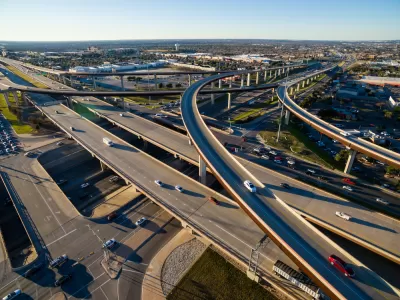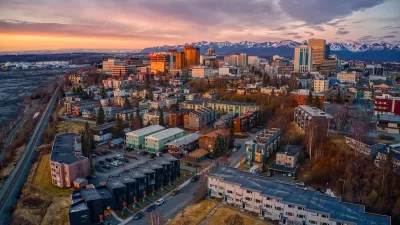An explainer of the monetary, environmental, and social costs of exuberant road building.

Reporting for KERA, Nathan Bernier outlines how the Texas Department of Transportation (TxDOT), which spends more on highways than any other state, funds its road projects. In the last ten years alone, Texas added 700 miles of new highways.
As Bernier explains, “The money for highways comes from a mix of gas taxes, vehicle registration fees, state sales taxes, levies on oil and gas companies and federal funds — which includes a big chunk of money from personal income taxes.” Historically, highways have been funded via a consumer gas tax that goes into the federal Highway Trust Fund. Now, federal dollars make up a smaller percentage of state’s road funding, and the Highway Trust Fund routinely runs out of money. “The federal gas tax — now 18.4 cents a gallon — hasn’t risen since President Bill Clinton's first year in office. The Texas gas tax is even older, frozen at 20 cents a gallon since 1991.”
Texas voters supported additional highway funding through several measures, letting the state dip into its Rainy Day Fund and allocating part of the state sales tax to road projects.
However, it’s not just about construction costs. “The true cost also includes external factors like traffic congestion, displacement, environmental impacts, and land use changes, all of which affect local communities.” Additionally, highways encourage sprawling suburbs and inefficient land use and prioritize driving over transit and other forms of transportation.
FULL STORY: Who pays for Texas highways?

Planetizen Federal Action Tracker
A weekly monitor of how Trump’s orders and actions are impacting planners and planning in America.

Chicago’s Ghost Rails
Just beneath the surface of the modern city lie the remnants of its expansive early 20th-century streetcar system.

San Antonio and Austin are Fusing Into one Massive Megaregion
The region spanning the two central Texas cities is growing fast, posing challenges for local infrastructure and water supplies.

Since Zion's Shuttles Went Electric “The Smog is Gone”
Visitors to Zion National Park can enjoy the canyon via the nation’s first fully electric park shuttle system.

Trump Distributing DOT Safety Funds at 1/10 Rate of Biden
Funds for Safe Streets and other transportation safety and equity programs are being held up by administrative reviews and conflicts with the Trump administration’s priorities.

German Cities Subsidize Taxis for Women Amid Wave of Violence
Free or low-cost taxi rides can help women navigate cities more safely, but critics say the programs don't address the root causes of violence against women.
Urban Design for Planners 1: Software Tools
This six-course series explores essential urban design concepts using open source software and equips planners with the tools they need to participate fully in the urban design process.
Planning for Universal Design
Learn the tools for implementing Universal Design in planning regulations.
planning NEXT
Appalachian Highlands Housing Partners
Mpact (founded as Rail~Volution)
City of Camden Redevelopment Agency
City of Astoria
City of Portland
City of Laramie




























